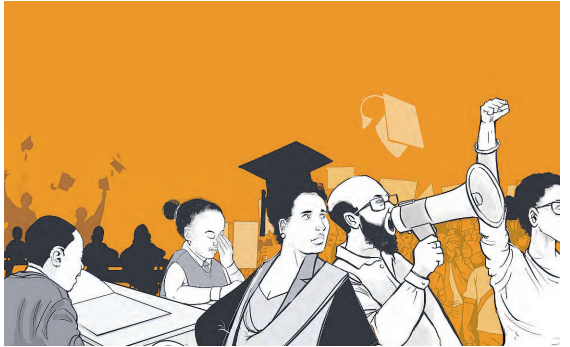

The best time to have resolved the crisis in public universities was months before the latest industrial action.
The next best time to sort out contentious issues is today.
Access to education is a constitutional right that should be respected.
Yet education
suffers widespread neglect down from early
childhood years, through to primary, junior secondary,
high school and university.
Education suffers a system generated turmoil thanks to lopsided priorities.
Mediating transition in the education sector comes with huge challenges, especially where systems – for lack of a better word – work at cross-purposes.
Meddlesome politics disrupted education right from the Daniel Arap Moi presidency.
There were three public universities – the University of Nairobi, Kenyatta University, and Moi University – in the 1980s.
But hawking these institutions for political currency has seen a burgeoning 35 institutions of higher learning.
Each relies on the National Treasury for capitation.
Public support for private institutions, and the interference with privately-sponsored students, have created a cash crunch for public universities.
Moi University’s attempt to diversify its income generation to survive, is the subject of investigations for possible procurement fraud.
The challenges of managing education will get heavier next year—the third year of implementing the Competence Based Curriculum.
The key transition point in the misnamed CBC is January.
The dearth of competence is eloquent.
A system that seeks to encourage competence during early years of childhood education remains a case study of poor planning.
The turbulence of transitioning from the 8-4-4 curriculum is undermining education in unconscionable ways.
Sabotaging education is hurting the confidence of children, their education and their future.
The education system is in a crisis: the new university funding model has been roundly rejected as expensive, punitive and discriminative.
The transition to CBC is failing.
About two months to a key transition point, no one is sure where Grade 9 learners will be hosted.
Junior secondary schools are crowded, without teachers and other facilities needed for competent management of CBC.
University lecturers ended a strike on Monday that wasted eight weeks.
Phase one of the first four weeks ended on September 26, with a failed compromise on contentious issues.
The second phase of the strike, which ended on Monday, began on October 29.
The tussle between University Academic Staff Union and the National Universities Staff Union on one side, and the state departments of Education, Labour and Treasury on the other, is undermining education.
Meanwhile secondary schools will not admit Form 1 students, next year, after the phaseout of the Kenya Certificate of Primary Education examination.
These schools will have idle facilities and teachers when JSSs are constrained for space, books, teachers and other resources.
The stalemate in public universities should not have been allowed to interrupt education schedule in the first instance.
Many interested parties are suffering a system generated crisis.
The mandarins at the ministries of Education, Labour and Treasury should understand the pain poor parents go through to register their children for a semester.
These functionaries need reason, conscience and patriotism to understand the implications of these orchestrated stand-offs.
Some parents rented out/sold family land, or livestock to fund their children’s education.
Some resorted to painful harambees that have poor returns on investment to raise university tuition.
These children have lost eight weeks of learning this semester, which stands the risk of being wasted unless lecturers and students double classes to catch up.
Lecturers, who raised legitimate livelihood issues, suff er triple jeopardy as parents, workers and mentors.
Author is a university journalism lecturer and climate change local actions advocate


 © The Star 2024. All rights reserved
© The Star 2024. All rights reserved